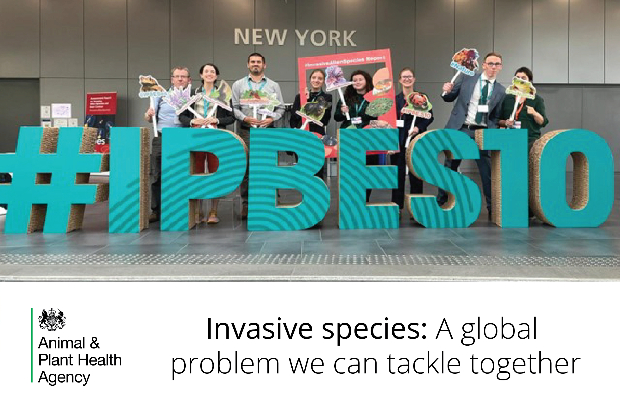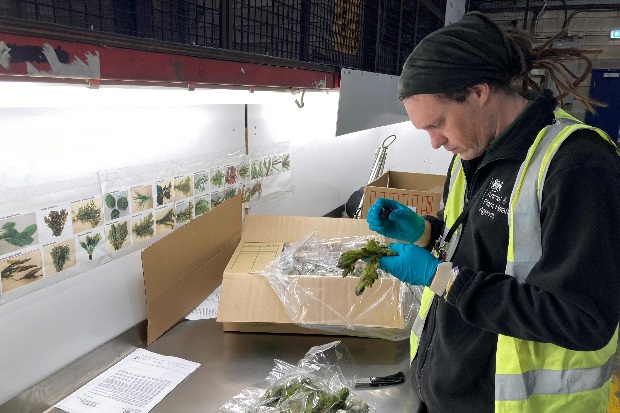
Invasive non-native species, sometimes known as invasive alien species, are one of the top threats to global biodiversity. In the United Kingdom they harm the environment and native wildlife, cost the economy almost £2bn a year and can even harm our health.
This week, a major new report on invasive species was published by the Intergovernmental Platform on Biodiversity and Ecosystem Services (IPBES). It highlights the seriousness of the threat posed by invasive non-native species but shows that by working together with greater coordination and resources we can successfully tackle the threat.
The report is extremely timely, given tough targets to tackle invasive species that have recently been agreed internationally as part of the Convention on Biological Diversity, and domestically in the Environmental Improvement Plan and GB Invasive Non-native Species Strategy.
What is IPBES?
IPBES is a global science-policy body tasked with providing the best-available evidence to decision makers, for people and nature.What are invasive non-native species?
Over 2,000 plants and animals have been introduced to Britain from all over the world by people. These are known as non-native species. Most are harmless but around 10-15% spread and become invasive non-native species, which impact the environment, economy or our health and way of life.
The Assessment
The Assessment of Invasive Alien Species and their Control was prepared over four years, with input from over 200 experts worldwide, including staff from APHA. Three co-chairs led the assessment, including Professor Helen Roy from the UK Centre for Ecology and Hydrology. The final report provides a state-of-the-art review of the impacts of invasive species across the world, and what can be done to tackle them.
Over 13,000 sources of invasive species knowledge are referenced, including scientific articles, government reports, and indigenous and local knowledge.
Invasive non-native species had already been identified as one of five main drivers of biodiversity loss in the IPBES Global Assessment (2019), and the key findings available in the IAS Assessment only underline their importance:
- Invasive species contributed to 60% of documented global animal and plant extinctions
- The annual global cost of invasive species was estimated to exceed $423bn in 2019
- Prevention, early detection and rapid intervention are the most cost-effective and sustainable approaches to managing biological invasions
While it highlights the serious threat posed by invasive species, a key finding of the report is that invasive species can be tackled with enhanced resources, ambitious policies, and greater international coordination.
APHA’s involvement
APHA colleagues reviewed the IPBES assessment numerous times on behalf of the UK government and last week attended the World Conference Centre in Bonn, Germany, to negotiate and agree the final text as part of the Defra-led UK delegation.
Despite tough negotiation into the night for almost a week, the plenary was finally able to approve the assessment on behalf of all 143 IPBES member states.

Tackling invasive species in the UK
The UK is already leading initiatives to tackle invasive species through the UK Biological Security Strategy, GB Invasive Non-native Species Strategy, and biosecurity improvements in our highly biodiverse Overseas Territories. In APHA, the GB Non-native Species Secretariat plays a critical role in developing and delivering these strategies, most recently through the establishment of a dedicated Non-native Species Inspectorate, and provides critical biosecurity support to our Overseas Territories.
“Invasive non-native species are one of the top five drivers of global biodiversity loss and have been a significant driver in 60% of global native species extinctions. In Great Britain they threaten a wide range of native species, habitats, and ecosystems. They also cause serious economic damage, costing the British economy at least £2bn per annum, and the global community well over $400bn USD.
Here at APHA we have a huge focus on invasive species, both at home and in the UK Overseas Territories, with teams including our Non-Native Species Secretariat and Non-native Species Inspectorate carrying out vital work every day.
Just some of the challenges we have faced in the UK over the last year have included an increase in the number of Asian hornet sightings as well as invasive ants, snails, plants, and predators such as raccoon dogs. The fact that we are contributing every day to a matter of international importance really underlines how vital our work is.”
David Holdsworth
Chief Executive Officer, APHA
GB Non-native Species Secretariat
The GB Non-native Species Secretariat (NNSS) coordinates work on invasive non-native species in GB and takes a leading role in delivering the GB Invasive Non-native Species Strategy. It is responsible to a Programme Board and statutory Committee for invasive species which represent the relevant governments and agencies of England Scotland and Wales. The NNSS works across numerous areas including managing introduction pathways, risk analysis, rapid response and contingency planning, awareness raising, stakeholder coordination, policy support and providing support to the UK Overseas Territories.
Non-native Species Inspectorate
Until recently, there was no dedicated inspectorate to detect and stop the introduction of invasive non-native species at the border or post-border. That changed in 2021, when the new Non-native Species Inspectorate (NNSI) was established.
While still at an early stage, and only a small team of 10, the NNSI has already made a substantial contribution to protecting GB from invasive species. They have conducted thousands of inspections, bringing those that trade in, import, and keep invasive species into compliance with the law.
The Inspectorate have also provided rapid responses to eradicate populations of invasive ants and plants from GB and have substantially helped to raise awareness of invasive non-native species among key stakeholders.

How you can help
Everyone has a part to play in protecting the environment from the impacts of invasive non-native species. Here are five simple things that you can do:
- Keep any boats, clothing, footwear and equipment used in water free of invasive non-native species – remember to Check Clean Dry after use.
- Be Plant Wise and do not let your garden, pond, or aquarium plants enter the wild.
- Take care of your pets, never release them, or allow them to escape into the wild. It is cruel and could harm other wildlife.
- Record your sightings of invasive non-native species, particularly Asian hornet and other alert species.
- If you enjoy being outside why not volunteer with a Local Action Group working on invasive species management.
For more information on non-native species, visit the NNSS website.
Subscribe to our blog
Throughout the year, we publish blogs which highlight the breadth of scientific work we are involved in as well as sharing our latest news and events we have attended.
Subscribing to our blog takes seconds and you will receive instant email alerts as soon as new blogs are published so why not subscribe today!

Recent Comments